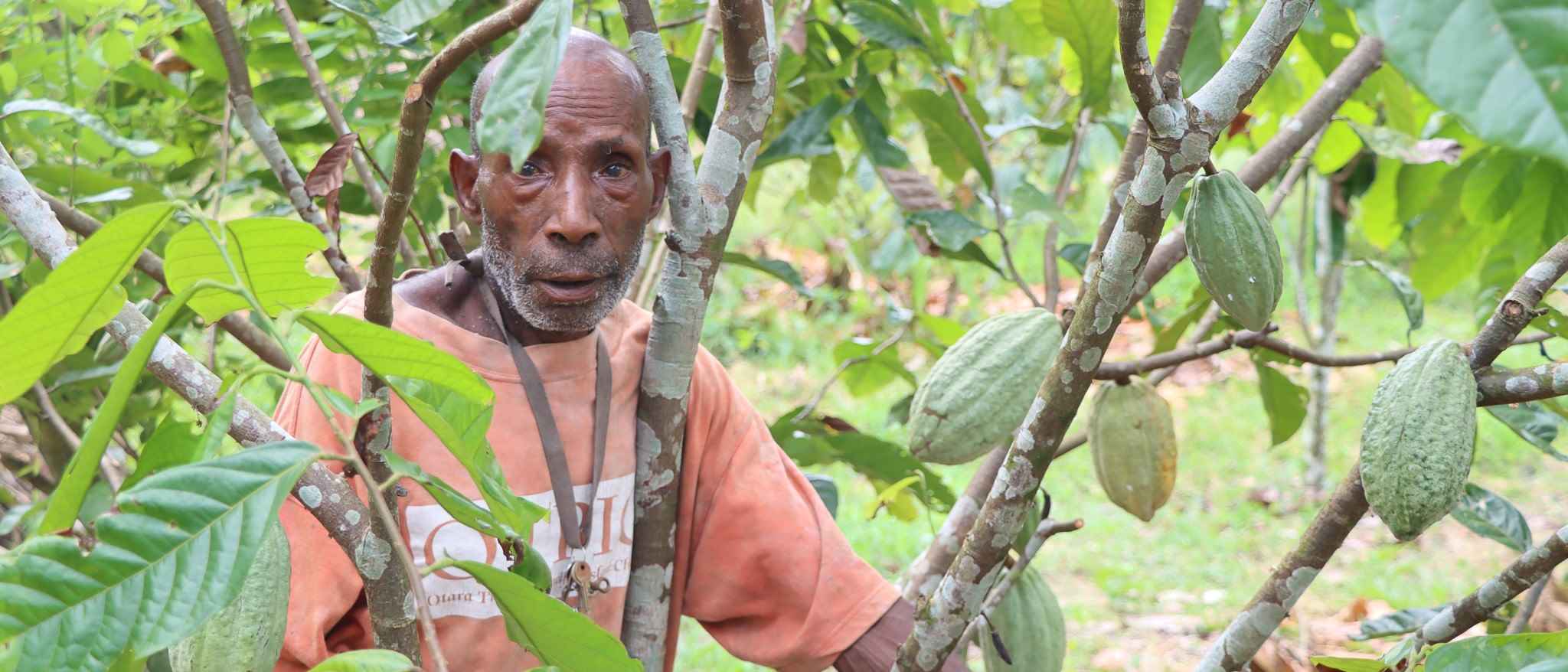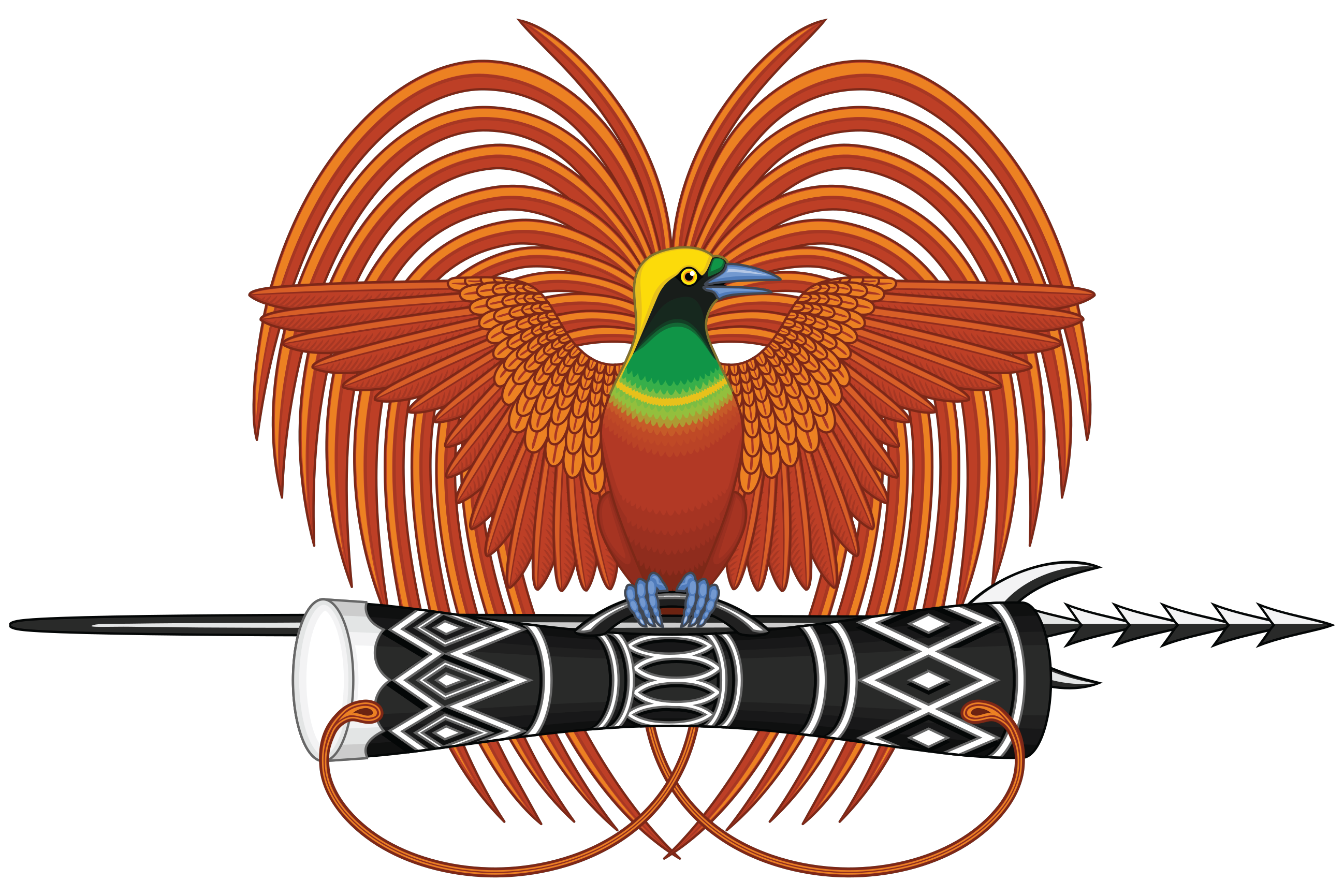From Isolation to Opportunity: Revived Cocoa Business Marks a Turning Point for a Remote Papua New Guinea Village
In Papua New Guinea's remote Osima Village, the EU-STREIT PNG Programme transforms lives through cocoa farming, market access, gender & youth inclusion, and infrastructure development, fostering economic growth and sustainable community empowerment.

Jeffery Osi, an elder and lead cocoa farmer in Osima Village, revived his old cocoa blocks using support by the FAO.
©FAO-STREIT
Vanimo, Papua New Guinea – In the northwest of Papua New Guinea, a remarkable transformation unfolds in Osima, a remote village nestled within the lush landscapes of the Bewani-Wutung-Onei Local Level Government, Green-Vanimo District, in the West Sepik Province. This community, a home to 3,000 inhabitants and a mere three-hour drive from the West Sepik provincial capital Vanimo, is emerging as a symbol of hope and economic rejuvenation.
For years, the villagers, bordered with West Papua, Indonesia, led a traditional lifestyle centred around hunting and gardening. They faced the deterring challenge of accessing markets in Vanimo and the Trade Point on the Papua New Guinea-Indonesia border due to sporadic public transport. "Waiting for hours on roadsides for transport, even for urgent medical needs, it was a nightmare," recounts Jeffery Osi, an elder and a lead farmer in the village, while explaining the hardships the villagers face for transportation.
However, 2021 marked a turning point. Guided by a visionary priest, Fr Zachery Miroi, and supported by the Food and Agriculture Organization of the United Nations (FAO) under the EU-STREIT PNG Programme, the farmers in Osima Village embarked on a journey towards economic empowerment. They were organised under two business groups, the Balkon Integrated Farming and the Isom Palms, comprising a total of 298 farmers, including 76 women and 34 youths, and ventured into cocoa farming.
Reviving Cocoa Farming
FAO supported the villagers with the establishment of two cocoa budwood gardens and two cocoa nurseries. Also, the farmers received 12,000 pest-tolerant cocoa seedlings to plant in their existing gardens and revive the run-down, pes-infested cocoa blocks. In addition, the FAO has provided vital training, tools, and materials, enabling the farmers to sharpen skills in nursery seedling propagation and cocoa block management.
This comprehensive support system initiates to transform the cocoa farming in Osima, without pursuing a course that results in deforestation. By now, many planted seedlings are fruiting. Jeffrey, who has received and planted 300 cocoa seedlings in his garden in early 2021, already completed two initial harvests and netted PGK 600 (about USD 160), fuelling his ambition to purchase a truck from his prospected increase in income, for community service and support his family. "I'm happy and really appreciate the European Union and the STREIT PNG Programme for giving us hope," Osi shares with a spark of optimism in his eyes.
Enhancing Market Access
The FAO's vision, under the EU-STREIT PNG Programme, reached far beyond cocoa bean production. Recognizing the need for a robust market ecosystem, the Organization has completed the construction of a cocoa export-oriented depot in Vanimo town. This facility promises to reduce freight costs and secure better market prices for high-flavour cocoa beans as they will be branded under PNG cocoa quality standards, a game-changer for the local economy that breaks the chains of limited buyers and ensures farmers' long-term success.
The EU-STREIT PNG Programme extends beyond agricultural development in the area. It emphasizes creating an environment conducive to sustainable agri-business growth, offering trainings in financial literacy, digital skills, group dynamics, and entrepreneurship. This holistic approach ensures the community's transition to a self-reliant future.
Furthermore, the Programme recognized the crucial role of gender equality and youth inclusion in agricultural development. Through awareness campaigns and training sessions, they ensured that women and young people became active participants in the cocoa value chain, their voices shaping the future of their community.
Through the EU-STREIT PNG Programme, the International Labour Organization (ILO) is also rehabilitating the vital Pasi-Krisa Road, a 25 km lifeline connecting 10,000 residents of the area to Vanimo, the provincial capital. This road rehabilitation project, injecting PGK 1 million into the local economy, is set to be an economic game-changer. The road project will create 20,000 workdays of decent employment for local youth and women during its construction phase. More than just an economic boost, this road project will halve travel time to Vanimo to just one hour and slash transport costs by 50%, significantly enhancing accessibility to markets, services, and agribusiness opportunities. The upgraded Pasi-Krisa Road is a key example of how infrastructure enhancements can positively transform local economies and improve the quality of life for rural communities.
Powering Social Services with Renewable Energy
The Village's transformation, propelled by the EU-STREIT PNG Programme, also touches on public facilities offering critical social services to the residents. It includes A Catholic Church-run station, including a sub-health centre and primary school, is being equipped with solar renewable energy, thanks to the United Nations Development Programme’s (UNDP) interventions under the EU-STREIT PNG. This advancement in energy infrastructure has improved the delivery of health care and education services, impacting over 10,000 inhabitants in Osima and neighbouring villages.
With this support, Doris Nukum, a young, dedicated nurse who has served the sub-health centre for 14 years, no longer struggles with inconsistent electricity that hampered her ability to care for patients. With the sun as her source of power, Doris can now deliver vital healthcare services, her torchlight replaced by the soft glow of reliable illumination.
Also, for the 222 students of the primary school, established in 1962, the arrival of solar energy opens doors to a world of learning previously shrouded in darkness. Gone are the days of outdated teaching methods; computers, printers, and the internet are now accessible, promising a future enriched with knowledge and opportunity for the young generations.
The impact of these changes resonates through the words of Fr Zachery: "As for myself, I see it as a changing point for the people to strengthen their lifestyle into the future."
The journey of Osima Village symbolizes a remarkable shift from traditional subsistence to sustainable economic growth. It's a story of communities working hand-in-hand with development partners, transforming isolation into opportunity, and cultivating a future filled with hope and prosperity. From the fertile fields of cocoa to the sunlit classrooms, the seeds of change have been implanted, promising a generous harvest not just of beans, but of a brighter tomorrow and countless other remote communities in Papua New Guinea.
About the EU-STREIT PNG Programme
The EU-STREIT PNG, being implemented as a United Nations Joint Programme (FAO as leading agency and ILO, ITU, UNCDF and UNDP as implementing partners), is the European Union's largest grant-funded initiative in the country. It focuses on boosting sustainable and inclusive economic development in rural areas. This is achieved by enhancing economic returns and opportunities within cocoa, vanilla, and fisheries value chains. Additionally, the Programme strengthens and improves the efficiency of value chain enablers, including access to ICT and digital financial services. It also supports the development of sustainable, climate-resilient transport infrastructures and renewable energy solutions. The Programme benefits two provinces: East Sepik and West Sepik.
Contact
Amir Khaleghiyan International Reporting and Communication Officer +675 7410 2860 [email protected]



